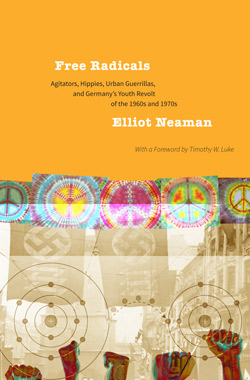“It wasn’t death that frightened him—that was a certainty—but rather the element of chance, the tumbling movement through time and space, which could descend any second into annihilation—this feeling of having worth and yet not being more than an ant that could be squashed in the street by the heedless step of a giant. Why, if there were a Creator, had he given men the desire to penetrate into the essence of a world that he could never fully fathom? Wouldn’t it be better if men lived like animals or plants than always with this terrible anxiety lurking beneath the surface of everything that they said and did?”
—Ernst Jünger, Sturm, describing the Battle of the Somme, whose centenary is this year.
|
Debates about the status of academic freedom in Israel, Gaza, and the West Bank have for years focused almost exclusively on claims about the negative impact particular Israeli government and Israeli Defense Force (IDF) policies and practices have had on Palestinian students and faculty. Largely ignored, especially as the Boycott, Divestment, and Sanctions movement (BDS) levels accusations against Israel and promotes boycott and divestment resolutions directed against the Jewish state, has been the broader character of academic freedom on Palestinian campuses. Indeed there is little evidence that most students and faculty in the West know what the major threats to academic freedom in Gaza and the West Bank are, let alone who is responsible for carrying them out. “Some believe themselves to be experiencing the end of the world. In reality we are only experiencing the end of the relation between land and sea, which had held up to this point. Still, human angst [Angst] in the face of the new is often as great as the angst in the face of the void, even when the new is the overcoming of the void. Thus, the many see only senseless disorder, where, in reality, a new sense struggles for its order. Admittedly, the old nomos falls away and with it a whole system of received measures, norms, and relations. But that which is coming is not therefore only measurelessness or a nothingness hostile to nomos. Even in the embittered struggle of old and new forces, just measures emerge and sensible proportions are constructed.” —Carl Schmitt, Land and Sea: A World-Historical Meditation “He tried to imagine how he looked: a trembling bundle in a torn uniform, with a blackened, sweat-streaked face and staring eyes. . . . He stood and tried to calm his nerves through a series of curses. He thought he had talked himself back into heroism, when a new and even more terrible impact hurled him back into his hole. A second that followed immediately upon the first broke off a huge piece of the trench wall and almost buried him. He writhed free from the mass of earth and ran along the trench. No man could be seen at his post. Once he stumbled over a heap of debris under which lay a dead body. Somehow, a long, jagged board had penetrated his body; his eyes, glassy and bulging, stood out of their sockets.” —Ernst Jünger, Sturm, describing the Battle of the Somme, whose centenary is this year. “If, in addition, one imagines not only that airplanes fly through the airspace over land and sea but also that radio waves from transmissions from all lands circle the globe uninterruptedly through the atmospheric space, then it would be easy to believe now not only that a new, third dimension has been achieved but also that even a third element has been added, the air, as a new elementary domain of human existence. To both the mythic beasts, Leviathan and Behemoth, a third would be added, a great bird. But we must not be overhasty with such consequential propositions. Indeed, if one thinks of the mechanized technical means and energies with which human power is exercised in airspace, and if one recognizes the explosive motors by means of which air machines are moved, then it appears that it is the fire that is the additional, genuinely new element of human activity.” Coming on October 1st: Elliot Neaman’s Free Radicals: Agitators, Hippies, Urban Guerrillas and Germany’s Youth Revolt of the 1960s and 1970s. Pre-order your copy in our online store, and we will ship it once it is available. Save 20% on the list price by using the coupon code BOOKS20 during the checkout process. Free Radicals
Elliot Neaman’s Free Radicals presents a comprehensive panorama of the West German youth revolt in the 1960s, as well as its subsequent fragmentation and descent into terrorism in the 1970s. Neaman argues that the activists of the 1960s fundamentally misconstrued the nature of the young German republic, conflating it with earlier problematic German polities, and offered hazy world-shattering utopias to replace it based on artificial historical comparisons. The student radicals at first were swept along by liberalizing forces, but then made a decisive turn against reform in favor of an aggressive rejection of the existing order. |
||||
|
Privacy Policy · Data Protection Copyright © 2026 Telos Press Publishing · All Rights Reserved |
||||



